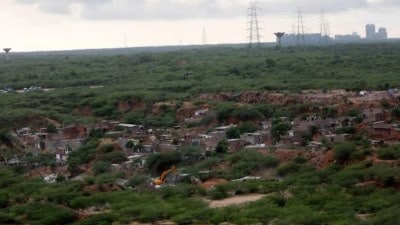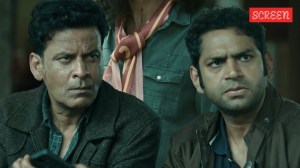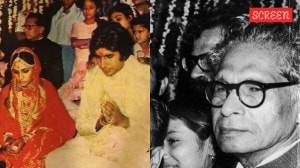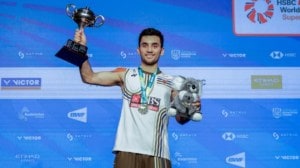The Sena tiger softens, but stripes remain unchanged
As Uddhav Thackeray’s recent comments on the Nupur Sharma episode show, the party has made a perceptible shift since the days of his father
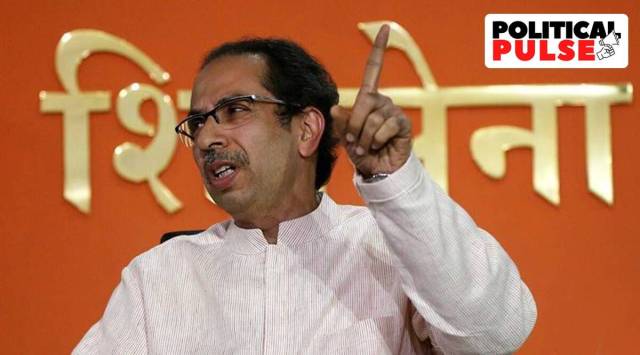 Though the party claims to hold on to the legacy of founder Bal Thackeray, it has undergone a perceptible shift under his son and current Maharashtra Chief Minister Uddhav Thackeray. (File)
Though the party claims to hold on to the legacy of founder Bal Thackeray, it has undergone a perceptible shift under his son and current Maharashtra Chief Minister Uddhav Thackeray. (File)The Shiv Sena is a party that grew and expanded on the back of an agenda of regional chauvinism and right-wing Hindu politics that often called for the disenfranchisement of Muslims. But though the party claims to hold on to the legacy of founder Bal Thackeray, it has undergone a perceptible shift under his son and current Maharashtra Chief Minister Uddhav Thackeray. This change, according to observers, has more to do with political expediency and limitations in outdoing the BJP on issues of Hindutva than any desire to give up the brand of politics that vaulted it into prominence in state politics decades ago.
In 1970, the party was involved in the Bhiwandi and Jalgaon riots in which 82 people lost their lives, while the Srikrishna Committee Report on the 1993 communal violence indicted Thackeray for directing a programme of violence against Muslims in Mumbai between December 1992 and January 1993.
On the back of the furore caused by BJP spokesperson Nupur Sharma’s comments about the Prophet, Uddhav Thackeray on June 8 challenged the BJP to an open debate on Hindutva and accused his party’s former ally of fanning communal sentiments for political gains. At the Shiv Sena’s Swabhiman rally in Aurangabad, the CM said, “What the (BJP) spokesperson said was not sensible. She insulted the Prophet … What was the need? Why? Because of the BJP spokesperson, the country is being insulted … The crime has been committed by the BJP and not the country. Why should we apologise? Why should the country suffer and be embarrassed because of a BJP spokesperson?”
The Sena seems to have softened its stance on many issues since Nationalist Congress Party (NCP) chief Sharad Pawar managed to get it into an alliance with his party and the Congress in 2019. In the last two years, the Thackeray-led party, which now identifies the BJP as its biggest political enemy, has made a number of public statements incongruous with its avowed Hindutva politics.
In January 2020, after a woman in Mumbai was booked for holding a placard mentioning “Free Kashmir” during a protest against violence at Delhi’s Jawaharlal Nehru University (JNU), Shiv Sena MP Sanjay Raut sought to defend her by explaining that the placard demanded freedom from restrictions imposed on the people of Kashmir following the revocation of Section 370 a few months earlier, and not secession.
Commenting on the JNU attack, the CM compared it to the 26/11 terror attacks in Mumbai. “I empathise with their feelings. The youth is the pillar on which the future of our society rests. We need to empower them. I am with them,” he said.
Earlier, he had equated the police lathi-charge on students of Jamia Milia Islamia University in New Delhi during a protest against the Citizenship Amendment Act (CAA) with the Jallianwala Bagh massacre. Incidentally, Sena MPs voted in favour of CAA in the Lok Sabha but abstained in the Rajya Sabha following pressure from the Congress.
“Nobody’s rights will be taken away. The government is strong enough to protect the rights of citizens of all religions,” Thackeray had said while trying to dispel the fears of Muslims in Maharashtra about the proposed National Register of Citizens (NRC).
According to political observers, despite this apparent softening, the Sena can never make the leap from an organisation with distinctly Hindutva instincts into a dyed-in-the-wool secular party. In April, as unease grew in a section of the party about the Maharashtra Navnirman Sena (MNS) setting the agenda in the mosque loudspeaker-Hanuman Chalisa episode and criticism from the Opposition for “abandoning Hindutva”, Thackeray defined his party’s brand of Hindutva as one of nationalism and not communalism.
“Those who tell us about Hindutva now, I ask them, what all have you done for Hindutva? When Babri (Masjid) was demolished, you went into hiding,” the CM said days after lawmaker-couple Navneet And Ravi Rana were arrested for threatening to recite the Hanuman Chalisa outside his residence “Matoshree” if loudspeakers were not removed from mosques.
Uddhav has also tried to come out of his father’s towering shadow. Last month, he said he was not “naïve” like his father and could see through the BJP’s “agenda”.
According to political observers, the generational shift in the party’s leadership, which will eventually lead to the baton passing to Aaditya Thackeray, may be one reason why the Sena is trying to drop its hardline image. Aaditya, a minister in the state government, is keen on creating an identity of a leader who champions socially progressive values.
But there is still a limit to which the Sena can tone down its messaging since it can still benefit electorally from issues of Hindutva. This is why even as he criticises the BJP over its version of Hindutva, the CM recently once again mentioned he had not forgotten his father’s promise to rename Aurangabad as Sambhaji Nagar.



- 01
- 02
- 03
- 04
- 05


